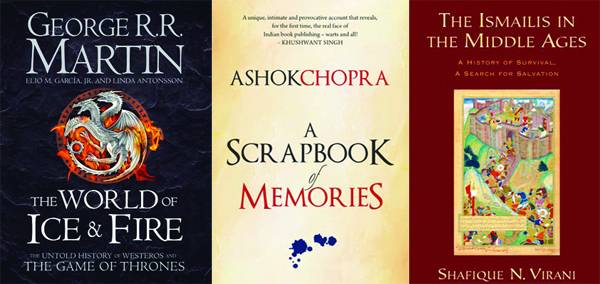
The World of Ice and Fire
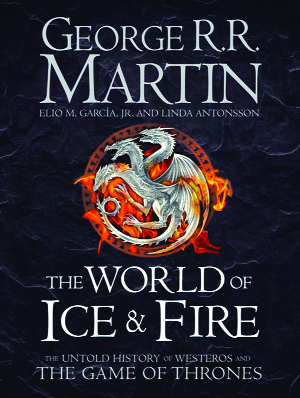
Elio M Garcia, Jr. and Linda Antonsson
HarperCollins [hardback], 2014
PRs 4,000
The never-before-seen history of Westeros and the lands beyond, with hundreds of pages of all-new material from George R. R. Martin. If the past is prologue, then Martin’s masterwork – the most inventive and entertaining fantasy saga of our time – warrants one hell of an introduction. At long last, it has arrived with The World of Ice and Fire. Martin, in collaboration with Elio M. Garcia, Jr. and Linda Antonsson, has written a comprehensive history of the Seven Kingdoms, featuring the epic battles, bitter rivalries, and daring rebellions that lead up to the events in the bestselling A Song of Ice and Fire series. Collected within this volume is the accumulated knowledge, scholarly speculation, and inherited folk tales of maesters and septons, maegi and singers, including over 170 full-colour illustrations and maps, family trees for the Houses Stark, Lannister and Targaryen, and in-depth explanations of the history and culture of Westeros. This is the definitive companion volume to Martin’s dazzlingly conceived universe. The World of Ice and Fire is indeed proof that the pen is mightier than a storm of swords.
The Ismailis in the Middle Ages: A History of Survival, a Search for Salvation
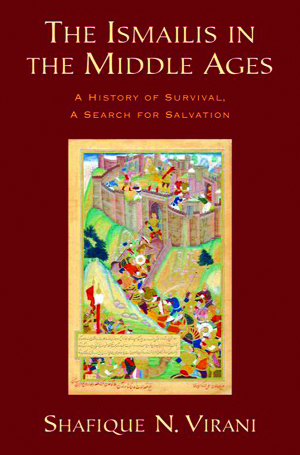
Shafique N Virani
Oxford University Press [hardback], 2007
PRs 895
“None of that people should be spared, not even the babe in its cradle.” With these chilling words, the Mongol warlord Genghis Khan declared his intention to destroy the Ismailis, one of the most intellectually and politically significant Muslim communities of medieval Islamdom. The massacres that followed convinced observers that this powerful voice of Shi’i Islam had been forever silenced. Little was heard of these people for centuries, until their recent and dramatic emergence from obscurity. Today they exist as a dynamic and thriving community established in over 25 countries. Yet the interval between what appeared to have been their total annihilation, and their modern, seemingly phoenix-like renaissance, has remained shrouded in mystery.
Drawing on an astonishing array of sources gathered from many countries around the globe, The Ismailis in the Middle Ages is a richly nuanced and compelling study of the murkiest portion of this era. In probing the period from the dark days when the Ismaili fortresses in Iran fell before the marauding Mongol hordes, to the emergence at Anjudan of the Ismaili Imams who provided a spiritual centre to a scattered community, this work explores the motivations, passions and presumptions of historical actors. With penetrating insight, Virani examines the rich esoteric thought that animated the Ismailis and enabled them to persevere. A work of remarkable erudition, this landmark book is essential reading for scholars of Islamic history and spirituality, Shi’ism and Iran.
A Scrapbook of Memories
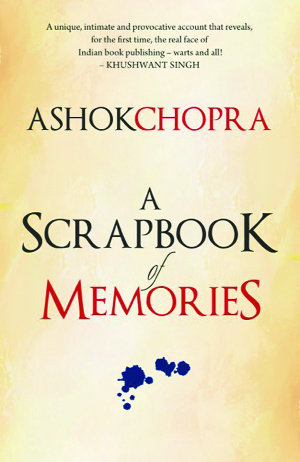
Ashok Chopra
HarperCollins Publishers India [hardback], 2015
PRs 1,400
For nearly 40 years, Ashok Chopra has been responsible for publishing some of the biggest names in India: Khushwant Singh, Shobhaa De, Dom Moraes, Dominique Lapierre and Larry Collins are part of his illustrious list. In this candid and colourful memoir, Chopra brings his long experience to explain what works and what doesn’t in the Indian market: Why do some books last when others don’t? Is there a winning formula for publishers and writers? What do readers in India want? How does one commission textbooks and reference guides? What should one do about bans and censorship? And how is the market holding up in the age of e-books and digital readers?
While going into the commercial aspects of publishing, he does not forget the human stories. Be it sourcing manuscripts, chasing celebrity authors like Dilip Kumar and Anupam Kher, scoring historic deals in the cut-throat world of publishing or managing egotists, eccentrics and windbags, Chopra’s adventures and ordeals are unfailingly entertaining. If he celebrates the hits (the runaway success of Freedom at Midnight, for instance), he does not leave out the misses (such as Shalimar, the book based on the movie, one of the biggest flops of Indian publishing). Along the way, he recounts scandalous episodes, stories of wild parties and lavish book events on warships and boats. Filled with rip-roaring revelations and honest reminiscences, this is the definitive story of English-language book publishing in India – tracing its journey from the winding lanes of Daryaganj in New Delhi to the glamour of high-profile book launches.
The Pity of Partition: Manto’s Life, Times and Work Across the India-Pakistan Divide

Ayesha Jalal
HarperCollins Publishers India [hardback], 2013
PRs 1,200
Saadat Hasan Manto (1912–1955) was an established Urdu short story writer and a rising screenwriter in Bombay at the time of India’s partition in 1947, and he is perhaps best known for the short stories he wrote following his migration to Lahore in newly formed Pakistan. Today, Manto is an acknowledged master of twentieth-century Urdu literature, and his fiction serves as a lens through which the tragedy of partition is brought sharply into focus. In The Pity of Partition, Manto’s life and work serve as a prism to capture the human dimension of sectarian conflict in the final decades and immediate aftermath of the British raj.
Ayesha Jalal draws on Manto’s stories, sketches, and essays, as well as a trove of his private letters, to present an intimate history of partition and its devastating toll. Probing the creative tension between literature and history, she charts a new way of reconnecting the histories of individuals, families, and communities in the throes of cataclysmic change. Jalal brings to life the people, locales, and events that inspired Manto’s fiction, which is characterized by an eye for detail, a measure of wit and irreverence, and elements of suspense and surprise. In turn, she mines these writings for fresh insights into everyday cosmopolitanism in Bombay and Lahore, the experience and causes of partition, the postcolonial transition, and the advent of the Cold War in South Asia.
Delhi Calm
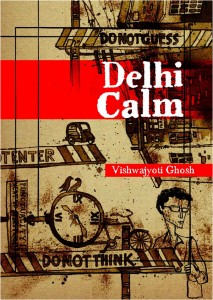
Vishwajyoti Ghosh
HarperCollins Publishers India [paperback], 2010
PRs 1,200
Imagine waking up one morning to learn that all your rights as citizen have been suspended this moment onwards. Imagine living the way the State tells you to being told how, where and when to laugh, live or love. Imagine constant surveillance all your acts, words, thoughts watched, all forms of expression subverted for the purpose of nation-building. Work More, Talk Less, yell microphones as you walk down the streets... But don’t lose heart, the trains are on time!
India, the mid-1970s. A time of democracy ruled with an iron fist. In this landscape of turmoil and unrest tours the Naya Savera Band, dreaming of change and stoking the fire of rebellion with music. But as reality intrudes and hostilities underlying the common dream rear up, idealist and poet VP, scholarly Master and ever-pragmatic Parvez drift away from each other... until their paths cross again in Delhi, in the middle of the biggest civil crisis to ever grip the nation. Once again, the trio find themselves reluctantly uniting against their common enemy, the State. Will they escape the ever-watchful eyes of the government? Will their dreams of an egalitarian, socialist democracy come to nothing? Will the Naya Savera Band raise its voice in song again? Find out in Vishwajyoti Ghosh’s graphic re-imagining of one of the most seminal moments in the history of Indian democracy.

